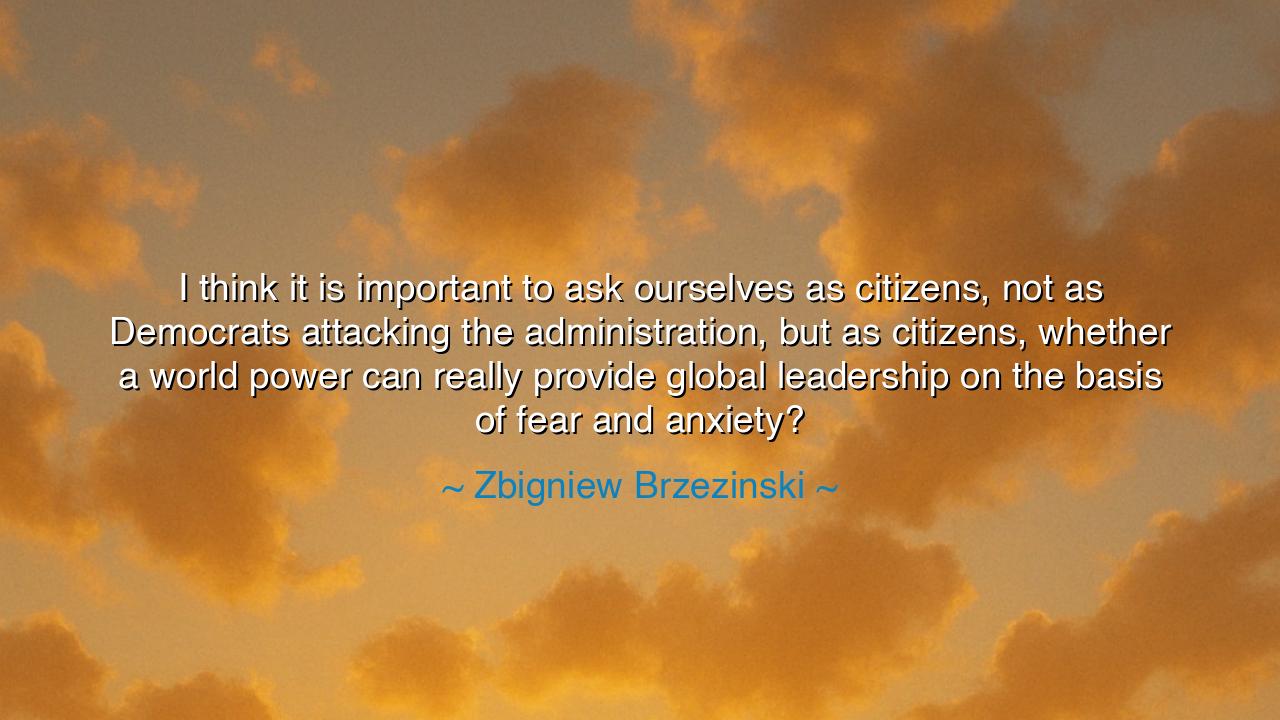
I think it is important to ask ourselves as citizens, not as
I think it is important to ask ourselves as citizens, not as Democrats attacking the administration, but as citizens, whether a world power can really provide global leadership on the basis of fear and anxiety?






When Zbigniew Brzezinski declared, “I think it is important to ask ourselves as citizens, not as Democrats attacking the administration, but as citizens, whether a world power can really provide global leadership on the basis of fear and anxiety,” he spoke as a man who had looked deeply into the heart of empire and seen its peril. His words are not a partisan rebuke, but a philosophical warning — a call to remember that true leadership cannot be born from fear, nor sustained by anxiety. For a nation that rules through intimidation loses the very moral authority that gives its power meaning. Brzezinski’s question, though posed to his generation, echoes through all of history: Can a civilization guide the world if it has lost its faith in wisdom, justice, and hope?
The origin of this quote can be traced to Brzezinski’s reflections during the years following the attacks of September 11, 2001, when the United States, in its grief and anger, had begun to reshape its identity as a global power. As a former National Security Advisor and one of the sharpest minds in American foreign policy, Brzezinski watched with concern as the country turned inward — guided more by fear of threat than by vision of peace. He saw a great nation risk trading its moral high ground for the illusion of safety, and in so doing, lose the essence of its leadership. His question was not about politics, but about the soul of a civilization — whether it would choose courage or cowardice, wisdom or reaction.
The ancients would have understood his warning well. In their chronicles, the rise and fall of empires often hinged not on armies or riches, but on the spirit of the people. When Rome was guided by justice and civic virtue, it ruled the known world with grace; when it turned to paranoia and cruelty, it decayed from within. Brzezinski’s insight is thus timeless: no empire, however mighty, can lead the world when it is ruled by fear of its own shadow. The heart of leadership — be it in nations, communities, or individuals — must always rest upon courage, compassion, and trust. Fear can build walls, but it cannot build unity; anxiety can protect borders, but it cannot inspire the world.
History gives us vivid lessons of this truth. After the Second World War, the United States did not conquer through fear but through vision. Through the Marshall Plan, it rebuilt what had been destroyed, helping former enemies rise from ruins. It offered hope where devastation reigned. That act of generosity became the foundation of modern global leadership — a power rooted not in domination, but in example. Yet when nations lose that moral compass, when they lead by fear — as did the tyrannies of the twentieth century — they sow distrust, resistance, and eventual collapse. Fear is never fertile soil for greatness.
Brzezinski, who had fled oppression in his youth, knew that fear is the tool of tyrants, not of leaders. His plea that citizens ask themselves this question — not as partisans, but as guardians of conscience — was a reminder that democracy depends not on rulers, but on the vigilance of the governed. If citizens allow fear to shape their politics, they invite manipulation; if they let anxiety dictate policy, they trade liberty for false security. Only when people think beyond fear, act beyond division, and stand for principle, can a democracy endure as a light to the nations.
The emotional depth of Brzezinski’s warning lies in its universality. It is not merely about America, but about the human condition itself. Every soul that seeks to lead — be it a parent, a teacher, or a ruler — must decide whether to inspire through fear or through faith. Fear may command obedience, but only faith commands devotion. The leader who rules by fear may win battles, but the leader who rules by hope wins generations. Thus, Brzezinski calls upon us to rise above the trembling spirit of the age and reclaim the nobility of leadership grounded in confidence, wisdom, and love for humanity.
So, let this be the teaching passed down: Do not build the future upon fear. A nation, like a person, must choose to lead with integrity, not intimidation. Seek understanding where others sow division, courage where others yield to panic. Remember that the greatest leaders — from Lincoln to Mandela — ruled not through fear, but through faith in the goodness of people. As Brzezinski teaches, power rooted in fear is fleeting, but power rooted in truth becomes eternal. For only those who rise above anxiety can guide the world toward peace, and only those who believe in humanity can be worthy to lead it.






AAdministratorAdministrator
Welcome, honored guests. Please leave a comment, we will respond soon